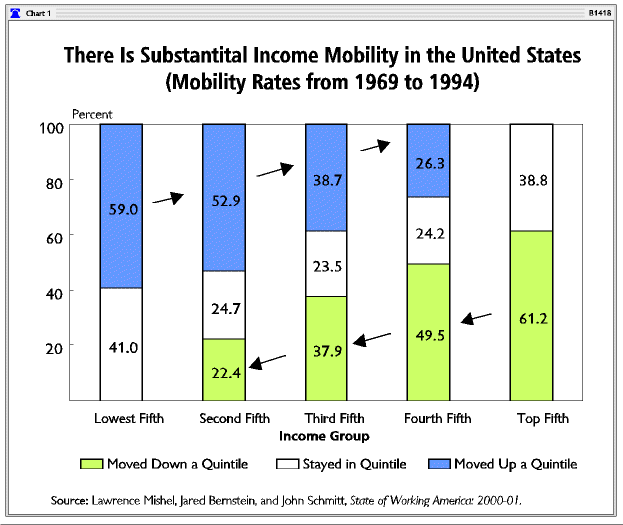Friday, May 20, 2005
Mobility over time
But then I�m speaking as a �former� member of the working class. I think farming, tire building, house painting and weatherizing (if you start my working life at age 16 that would cover 1969-1984) count as �working class.�If you want to trade creds, mine are 1.) feeding cardboard into a box cutting machine, where a few handshakes with long-term employees tells you the dangers of the business; 2.) driving a truck for the Manchester Union Leader up to Laconia and back to deliver newspapers; 3.) unloading trucks and railcars. My family's been in warehouses and loading docks for three generations. My generation, the second since Hovhannes picked up Culenia from the ferry from Ellis Island, is the first to get off the docks. Which is the point Mark misses.
I realize the hard right�s been trying to bust up that Marxist �working class� meme for some time now, but people who work know they work. No one pushing a broom has any illusions about being part of some other class.
Um, bullshit. People, young and not so young, think they will become millionaires. David Brooks points out that poor Republicans think they can get ahead with hard work. Looking at the same Pew study Brooks did, there are equal share of financially stressed individuals who the study calls "disaffecteds" shows support for tax cuts, controlling spending to close the budget deficit, and a fair amount of social conservatism (e.g., 67-26 against gay marriage).
They�re working, and they have the callouses and pulled muscles to prove it. They�re not entrepreneurs, they�re not self-employed, they�re not one of a thousand points of light. They�re the people who empty wastebaskets, rewire fixtures, install cabinets and build things.
At that moment in time, yes, but not over time. A famous study from the Urban Institute quotes Joseph Schumpeter that compares the income distribution to "a hotel�full of rooms that are always occupied, but often by different people." I will use a chart from Heritage to show how rooms get changed (they didn't make the chart, it comes from this book).
Giselson lives in a view that this mobility doesn't happen. The mobility can exist even while there is greater inequality in general (something that may happen because of new technologies increasing the return on human capital, and not due to any sinister "soak the poor" government policies.) See these graphics from the New York Times as well. While they argue that mobility is lessening, they also note that only 37 of the Forbes 400 inherited their wealth. (Other sources for information here.)
When they leave the room you know they�ve been there, unlike the �thinking class� (my current peeps). The thinking class leaves no trace unless you�ve got our most recent URL, and our contribution to society is often just as intangible. Thinking class people have to explain what it is they do. Working class people have jobs that are immediately obvious.
I have no idea what he thinks the "thinking class" is. If he means those that create or process information, he should be aware of the great expansion of GDP that has happened even for the poor, and even not in the US. Heard of Grameenphone? You should. Is Yunus no more than a URL?
The thing which grates me about Mark's post, though, is that somehow he escaped the working class but that the others are not going to. I did too, and I guess I'm supposed to believe I'm special. Well, I don't. I consider myself lucky, but that's for finding Mrs. S and having #1 and Littlest S and some friends that have waltzed into my life unexpected and stayed and set up shop. Do I have special skills? No more than anyone else, what I have is a comparative advantage and a country in which I can pursue it. It's why Hovhannes came here, to pursue his comparative advantage away from the threat of massacres in his home country. He worked on a print shop floor until it closed in the Depression, then he worked in construction until pneumonia killed him. It's why Culenia told her kids to speak English only at home, because it made no sense to go back to the old country, particularly without a husband. She scrubbed floors for the neighboring WASP families who owned shops and got two of her kids through college, one of them my father, who still returned in the end to working with his hands and back, because that's what he did best.
If I had less than ten thumbs and a stronger back, I might be there yet now. But I had options and a different skill set than my father or brother, who stayed on the docks until his back told him to get into sales. He has options, and skills.
So does everyone else. Even Mark. But he won't talk to them that way, lest we "bust up that Marxist �working class� meme," because busting the meme means admitting markets work. Rather than do that, he'd rather continue the myth that people can't move.









